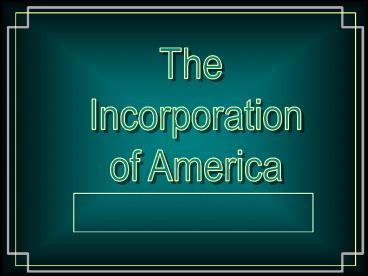The Incorporation of America
1 / 23
Title:
The Incorporation of America
Description:
Title: The Incorporation of America Author: Susan M. Pojer Last modified by: krobinson Created Date: 1/12/2003 2:03:40 AM Document presentation format – PowerPoint PPT presentation
Number of Views:7
Avg rating:3.0/5.0
Title: The Incorporation of America
1
The Incorporation of America
2
Benefits of Big Business
- Large companies could manufacture enough products
to meet national demand. - Produced better products for lower cost.
- Paid high salaries to get experts.
- Increased efficiency
3
Big Business Tactics
- Demand volume discounts.
- Sell at a loss until their competition shuts
down. - IF/when it becomes a monopoly, it controls prices.
4
Mixed Feelings Toward Big Business
- Worried about corrupting influence of power and
wealth, but liked the low prices, efficiency, and
national markets. - Same as feelings toward outsourcing today.
5
Role of Corporations
- Corporation is an organization owned by many but
treated by law as an individual. Can own
property, sue/be sued, enter into contracts. - Owners are called stockholders own shares of
partnership called stock. - Issuing stock allows the corporation to raise
money, or financial capital, while diluting the
risk.
6
Limited Liability
- Stockholder risks no more than the sum originally
invested. - If the corporation cannot pay its debts and goes
bankrupt, stockholders (owners) are not
personally responsible for paying its debts.
7
Economies of Scale
- With large capital, corporations could invest in
new technologies, hire large workforce, purchase
more machines. - Corporations can make goods more cheaply because
they produce so much so quickly using large
manufacturing facilities. - Small companies could not compete and went
bankrupt.
8
- Americas Industrialists Captains of Industry
- Or
- Robber Barons?
9
The Robber Barons of the Past
10
Robber Barons term implies that leaders built
their businesses by stealing from the public
using unfair business practices Captains of
Industry credits these Industrialists with
creating the industrial power of the US
11
New Business Culture
- Laissez Faire ? the economic theory of the
Industrial Age.
- Individuals should compete freely in the
marketplace. - No room for government in the market!
12
2. Social Darwinism
- British economist.
- Advocate of laissez-faire.
- Adapted Darwins ideas from the Origin of
Species to humans. - Survival of the Fittest applied to business
Herbert Spencer
13
Social Darwinism in America
- Individuals must have absolute freedom to
struggle, succeed or fail. - Wealth is a reward for smarts and hard work.
- The strongest companies will survive, the weak
ones will perish. - Govt should not interfere with the natural
selection of successful businesses.
14
Cornelius Commodore Vanderbilt
Cant I do what I want with my money?
15
William Vanderbilt
- The public be damned!
- What do I care about the law? Haint I got the
power?
16
Andrew Carnegie
Scottish immigrant Rags to Riches 1st major
steel company in US (now US Steel) Vertical
Integration Gospel of Wealth Philanthropist
17
Vertical Integration
- Owns all of the businesses that its needs in
order to operate - Saves company money even while company becomes
bigger - Carnegie Steel bought coal mines, limestone
quarries, iron ore fields.
18
The Gospel of Wealth
- Wealth is not looked upon as bad.
- but is
- Viewed as a sign of Gods approval.
- Christian duty to accumulate wealth. (Protestant
work ethic) - Wealthy people have responsibility to use their
wealth for the benefit of society. Thus many
endowed colleges, libraries, scholarships, etc.
19
John D. Rockefeller
- Founder of Standard Oil
- controlled 90 of US
- oil refining
- Widely criticized for his
- business practices
- horizontal consolidation
- forced rebates
- trusts
- Legacy as philanthropist
20
Horizontal Integration
- Buys out same type of business.
- Big oil company (Standard Oil) buys out little
oil companies. - When owns all of same type of companies, has a
monopoly. With no competition, can set prices
where it wants.
21
Standard Oil Co.
22
TRUSTS
- A trust is formed when several companies give
control of their corporations to a single board
of trustees. - Did not violate state laws forbidding one company
to own stock in another company without first
getting permission from state - Enabled trustees to control a group of companies
as if they were one large merged company
23
BILL GATES
Chairman and chief architect of
Microsoft Richest man in world Bill and
Melinda Gates Foundation































